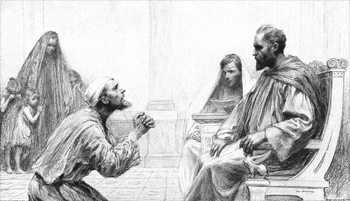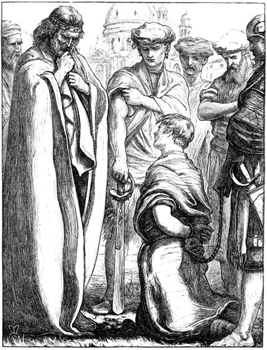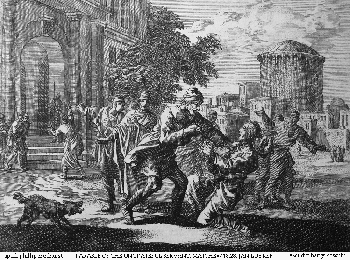For Sunday September 13, 2016
Lectionary Readings (Revised Common Lectionary, Year A)
Genesis 50:15-21
Psalm 103: (1-7),8-13
Romans 14:1-12
Matthew 18:21-35
First, a confession: I feel ambivalent about writing an essay on forgiveness. Not because I disdain forgiveness, or consider it anything less than essential to the Christian life. But because I’m hyper-aware of how forgiveness is sometimes deployed by Christians to fend off questions about power, justice, repentance, and lament. This is especially true right now in the United States, where the pressing call for racial equality and healing is too often met in the Church by premature demands for forgiveness. Often — and to our shame — we Christians turn the concept of forgiveness into a weapon, and use it to silence people who cry out against injustice.
In this week’s Gospel reading, Jesus tells the disciple Peter that forgiveness in the kingdom of God must be generous beyond limits. We shouldn’t forgive our offenders a mere seven times, but rather, seventy-seven, or seventy times seven. In other words, forgiveness should be our regular practice, our way of life, our default mode. Why? Because we are first and foremost a forgiven people — a people generously and lavishly forgiven by God. In light of the abundant grace in which we stand, what possible response can we have, but to pay the wealth of God’s forgiveness forward?
Again, I believe wholeheartedly that Jesus’s teaching in this Gospel passage is powerful and life-giving. But given the context we find ourselves in right now, it feels essential to begin in a different place. Before we explore what forgiveness is, we need to stress what forgiveness is not.
Forgiveness is not denial. Forgiveness isn’t pretending that an offense doesn't matter, or that a wound doesn't hurt, or that Christianity requires us to forget past harms and “let bygones be bygones.” Forgiveness isn't acting as if things don't have to change, or assuming that because God is merciful, God isn’t grieved and angered by injustice.
On the contrary, the starting line of forgiveness is the acknowledgement of wrongdoing. Of harm. Of real and profound violation. Whenever we talk about the need for forgiveness, we must begin by recognizing and naming the extent of the brokenness. Why? Because we were created for good. We were created for love, equality, tenderness, and wholeness. As image-bearers of God, we were made for a just and nurturing world that honors our dignity. When we experience any deviation from that basic goodness, it is appropriate — it is human and healthy and Christian — to react with horror.
 |
Though we contemporary Christians squirm away from this truth, one of the great gifts of Christianity (at its best) is that it takes sin and sin’s consequences dead seriously. Sin wounds. Sin breaks. Sin lingers and echoes down the ages. And so forgiveness isn't an escalator; it's a spiral staircase. We circle, circle, and circle again, trying to create distance between the pain we’ve suffered and the new life we seek. Sometimes we can’t tell if we’ve ascended at all; we keep seeing the same, broken landscape below us. But slowly, slowly, slowly, our perspective changes. Slowly, slowly, slowly, the ground of our pain falls away. Slowly, slowly, slowly, we rise.
Forgiveness is not a detour or a shortcut. The same Bible that calls us to forgive also calls us to mourn, to lament, to speak truth to power, and to hunger and thirst for righteousness. Forgiveness in the Christian tradition isn't a palliative; it works hand-in-hand with the arduous work of repentance and transformation. In other words, there is nothing godly about responding to systemic evil with passive acceptance or unexamined complicity. As theologian and anti-Nazi dissident Dietrich Bonhoeffer warns us, we must never allow forgiveness to degenerate into "cheap grace." That is, "the preaching of forgiveness without requiring repentance, baptism without church discipline, Communion without confession… grace without the Cross."
We don't hear much about righteous anger in mainline churches these days. After all, there's something unseemly about rage, right? Something unsophisticated, something crude? It's not polite to get angry, and it's positively insupportable to stay angry. It's not what good Christian people do.
If you feel this way, then consider that righteous anger is very much what Jesus did. Remember him cleansing the temple with a whip? Remember him blasting the religious hypocrites of his day for oppressing the poor? Remember him rebuking his disciples for blocking vulnerable children from his presence? Yes, Jesus forgave. But he also raged. He also resisted all violations of sanctuary. He also called out anyone who blocked access to his Father's house. He also denounced the mistreatment of the most vulnerable and beleaguered people in his society.
 |
In other words, there is a time to get angry and stay angry. A time to insist on change. A time to say, "Enough is enough." Yes, we are called to practice and preach forgiveness. But I believe it is also the task of the Church to take sin as seriously as Jesus did — with impassioned and sustained cries for justice.
Forgiveness is not synonymous with healing or reconciliation. Healing has its own timetable, and sometimes reconciliation isn't possible. Sometimes our lives depend on us severing ties with our offenders, even after we've forgiven them. In this sense, forgiveness is not an end; it’s a beginning. An orientation. A leaning into the future. Where it will lead is not pre-ordained.
For this reason, I worry that romanticizing forgiveness obscures its communal, multi-layered power. This is always true, but it is especially true when we're talking about marginalized communities. In (white) Christian America, it's too easy to think of forgiveness as a culminating act, as a redemptive, "happily ever after" ending to the story of race-based violence.
But when, for example, victims of racial hatred forgive their racist oppressors, they're not ending anything; they're preparing their hearts to begin. To resist. To approach the battlefield one more wearisome time. Forgiveness enables the oppressed not only to survive, but to lay down the cumbersome weight of hatred and bitterness, and gear up for the fight. Forgiveness is the beginning of the hard work of building God's kingdom — not the end.
And finally, forgiveness is not quick and easy. Not for us humans. Not if we’re honest. Forgiveness is a process — a messy, non-linear, and often barbed process that can leave us feeling whole and liberated one minute, and bleeding out of every vein the next. In my experience, no one who glibly says the words "I forgive you" gets a pass from this messy process, and no one who struggles extra hard to forgive for reasons of temperament, circumstance, history, or trauma should feel that they're less spiritual than those who don't.
Of course, yes, there are times when forgiveness happens dramatically and instantly. But most of the time, there is no cathartic, "altar call" moment when the hurts of the past simply slip off our backs and roll away. There is only the daily business of forgiveness as a slow, sustained way of life. A practice enacted one layered, complicated, and unsentimental moment at a time.
Okay. If forgiveness is not denial, or a shortcut, or a reconciliation, or an easy process, then what is it? What exactly is Jesus asking of us when he tells us to forgive each other again and again and again and again?
In her popular memoir, Traveling Mercies, Anne Lamott writes that withholding forgiveness is like drinking rat poison and then waiting for the rat to die. Nora Gallagher writes, "Forgiveness is a way to unburden oneself from the constant pressure of rewriting the past." Henri Nouwen writes, "Forgiveness is the name of love practiced among people who love poorly. The hard truth is that all people love poorly, and so we need to forgive and be forgiven every day, every hour increasingly. Forgiveness is the great work of love among the fellowship of the weak that is the human family."
 |
If these writers are correct, then I think forgiveness is choosing to foreground love instead of resentment. If I'm consumed with my own pain, if I've made injury my identity, if I insist on weaponizing my well-deserved anger in every interaction I have with people who hurt me, then I'm drinking poison, and the poison will kill me long before it does anything to my abusers. To choose forgiveness is to release myself from the tyranny of my bitterness. To trust that my frenzied longing for vindication and justice is known to God. To cast my hunger for healing deep into Christ’s heart, because healing belongs to him, and he's the only one powerful enough to secure it.
I wonder if we're often squeamish about forgiveness because we misunderstand the nature of unconditional love. Foregrounding God's all-embracing love doesn't for one second require us to relativize evil. If it did, God's love would be cruel and weak, not compassionate and strong. But where we humans make love and judgment mutually exclusive — where we cry out for revenge, retribution, and punishment — God holds out for restorative justice. A kind of justice we can barely imagine. A kind of justice that has the power to heal both the oppressed and the oppressor.
Secondly, I think forgiveness is a transformed way of seeing. A way of seeing that is forward-focused. Future-focused. Eschaton-focused. Again, I don’t believe that abuse and oppression are ever God’s will or plan for anyone. But I do believe that God is always and everywhere in the business of taking the worst things that happen to us, and going to work on them for the purposes of multiplying wholeness and blessing. Because God is in the story, we can rest assured that our wounds will not end in loss, trauma, brokenness, and defeat. There will be another turn, another chapter, another path, another grace. Because God loves us, we don’t have to forgive out of scarcity. We can forgive out of God’s abundance.
Lutheran minister Nadia Bolz-Weber, after describing mistreatment as a chain that binds us, writes stunningly about the power of forgiveness to free us for the work of justice and transformation. I want to share her words in conclusion, because they speak so powerfully to me:
“Maybe retaliation or holding onto anger about the harm done to me doesn’t actually combat evil. Maybe it feeds it. Because in the end, if we’re not careful, we can actually absorb the worst of our enemy, and at some level, start to become them. So what if forgiveness, rather than being a pansy way to say, ‘It’s okay,’ is actually a way of wielding bolt-cutters, and snapping the chains that link us? What if it’s saying, ‘What you did was so not okay, I refuse to be connected to it anymore.’? Forgiveness is about being a freedom fighter. And free people are dangerous people. Free people aren’t controlled by the past. Free people laugh more than others. Free people see beauty where others do not. Free people are not easily offended. Free people are unafraid to speak truth to stupid. Free people are not chained to resentments. And that’s worth fighting for.”
As I let these words wash over me again and again, I pray — first for myself, and then for all of us — that we will take up the hard work of forgiveness for the sake of a broken and desperate world. I believe it is the most important work we can do as the children of a God who grieves and rages against oppression. May we loosen the chains that bind us. May we rise. And may we always pay forward the healing grace and forgiveness of God, until justice reigns.
Debie Thomas: debie.thomas1@gmail.com
Image credits: (1) Still Roman Catholic After All These Years; (2) In, With, and Under; and (3) Wikimedia.org.





